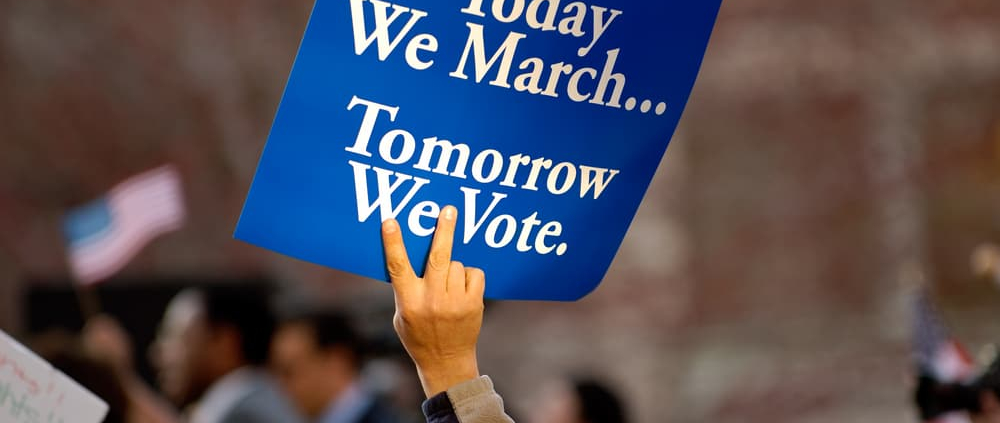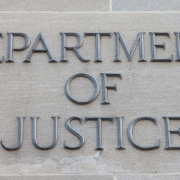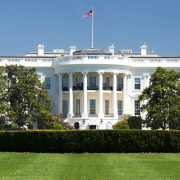We Must Overcome
By civilrights.org
This pivotal moment demands a powerful recommitment to protecting our democracy
On Thursday, March 7, President Biden will deliver the final State of the Union address during his first term in office, and it will take place on a day when our nation will remember one of the most pivotal moments in the American struggle for multiracial democracy.
Fifty-nine years ago this Thursday, brave foot soldiers of all races and religions in Selma, Alabama marched across the Edmund Pettus bridge and risked everything for the freedom to vote. They were beaten. They were tear-gassed. They were arrested. The late Congressman John Lewis, then a young civil rights activist, had his skull fractured at the hands of Alabama state troopers. Images of what became known as Bloody Sunday horrified the nation and inspired action. Indeed, just eight days later, President Lyndon Johnson addressed a joint session of Congress — just as President Biden will do this week — and demanded passage of voting rights legislation. “It is wrong – deadly wrong – to deny any of your fellow Americans the right to vote in this country,” he said.
Congress listened. Five months later, President Johnson signed the Voting Rights Act into law and moved our nation closer to its true promise of a democracy of, by, and for the people.
Today, we need from all of our leaders this same forceful commitment to protecting the vote and securing our freedoms. And this year in particular is a powerful reminder of the hard-fought gains of the civil rights movement and how far this nation has come — but also of the ongoing challenges we face and attacks by those who wish to turn back the clock, reverse our progress, and divide our communities.
- This year will mark 70 years since the landmark Brown v. Board of Education decision declared that racial segregation is inconsistent with equality, but we are still facing attacks on affirmative action and shameful attempts to ban books, marginalize trans students, and whitewash or erase the truth about our nation’s history.
- This year will mark 60 years since the Civil Rights Act of 1964 outlawed discrimination in many facets of American life, but we are still facing efforts to ban diversity and inclusion initiatives, divide our communities, and turn back the clock on our nation’s important civil rights achievements.
- This year will mark 60 years since Freedom Summer sought to register Black voters in Mississippi, but we are still facing cruel attempts to silence voters, make registering to vote and casting a ballot more difficult, and hinder our ability to build a multiracial democracy that works for all of us.
- And this year will mark 15 years since the Matthew Shepard and James Byrd, Jr. Hate Crimes Prevention Act expanded federal hate crime law, but we continue to face a concerning rise in hate and the threat of white supremacist violence.
This history matters because it provides perspective, helps us to understand the factors that caused change, and reminds us what is possible at a moment when we are fighting for the future of our democracy. The nation witnessed what happened in Selma, and our leaders, with powerful demands from the civil rights community and activists across the country, took action. Still, anti-voter efforts continue and must be addressed. Decades after Brown v. Board and the 1964 Civil Rights Act, attempts to chip away at these landmark achievements are not slowing down. The attacks persist, and so must our solidarity and collective fight for the nation we all deserve.
Today, extremist special interests are trying to control our bodies, our lives, and our futures, and they will not stop until they undermine our most essential civil and human rights. That’s why we must continue to urge our leaders — including President Biden, members of Congress, and elected officials across the country — to meaningfully address the significant issues facing our nation. This includes protecting voting rights, ensuring judges at every level of the judiciary are highly qualified and committed to equal justice, securing reproductive freedom for all, passing economic justice measures so that all people can thrive, fighting hate and bias in all forms, working toward a criminal-legal system that delivers true justice, providing all students with safe and well-resourced schools where they can learn and succeed, and more.
We must also work to create a future where technology, including AI, empowers rather than discriminates. That’s why we launched the Center for Civil Rights and Technology, an unprecedented initiative to create a fair, just, opportunity-rich, and rights-advancing future for all in the face of artificial intelligence. The Center will serve as a convener, collaborator, and communicator on policy issues, ideas, and potential innovations that can advance, as well as protect, equity in society.
Eight days after Bloody Sunday, President Johnson repeated the words used by so many during the civil rights movement: We shall overcome. Today we must overcome every attack on equal opportunity and every attempt to silence our voices. We must unite our communities in the common struggle to protect and preserve our rights and our democracy. And no matter what obstacles are deliberately placed in our way, we must persist and fight on together for our shared vision of an America as good in practice as it is in promise — an America as good as its ideals.













Leave a Reply
Want to join the discussion?Feel free to contribute!